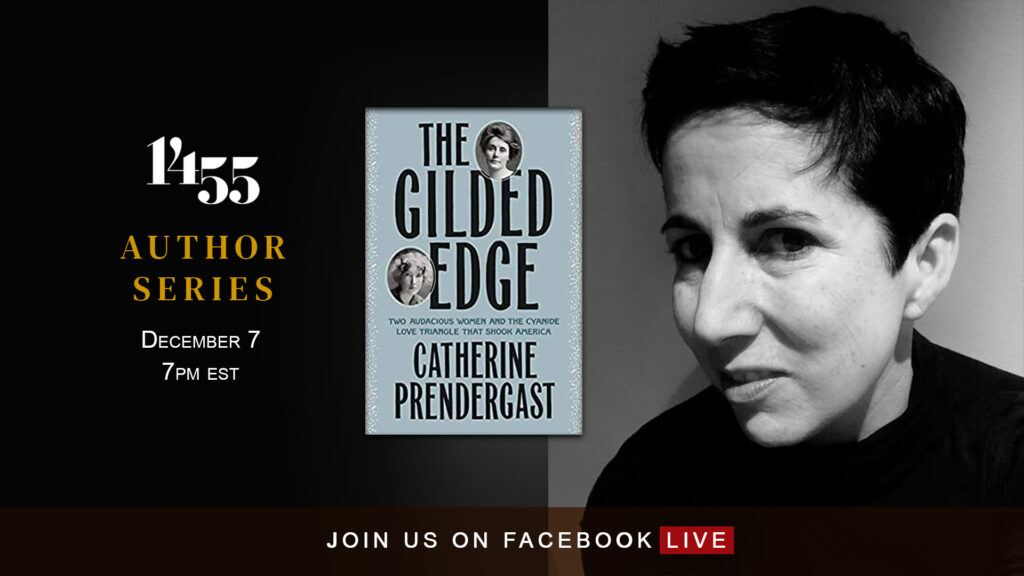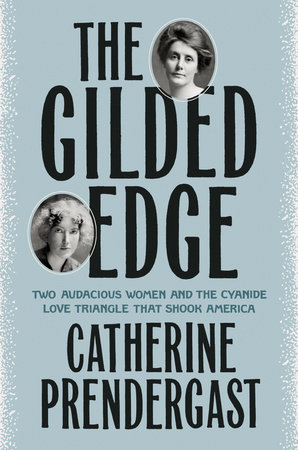
In addition to being 1455’s last Author Series event for 2021, this discussion is a culmination of sorts that fills me with both joy and pride. I first met Catherine at the Noepe Center at Martha’s Vineyard in 2016, when I was serving as writer in residence (shout out as always to the visionary Justen Ahren). Catherine and I hit it off immediately, both as people and writers, and this is when I learned about the massive undertaking she was already deeply engaged with.
I’m grateful for the opportunity to have read and now celebrate the publication of this book, which is a considerable achievement. It’s obviously a labor of love (emphasis on labor) and it reminds me of everything I adore about scholarly research and the pursuit of the well-written word: so easy to admire, so difficult to accomplish. In my promotion for this event, I describe The Gilded Edge as being like a novel wrapped in a true-crime story layered into a historical narrative and a lot of other things, all of them awesome. What I hope to emphasize is that this book can and should be acknowledged as a feat of research, organization, and execution of the first order, but it’s also written to inform and entertain; it’s the latter so much academic writing gets rightly lambasted for so often not taking into consideration.
No spoiler alerts: the best way to understand –and appreciate– this book is to read it, immediately. However, it’s safe to suggest Dr. Prendergast’s scholarship is informed by a desire to right wrongs of previous generations that acted as gatekeepers to literary and cultural history. In particular, one primary mission of this book is ensuring that discussion turns, rightly, to women: we need to be reminded (or informed) about the conditions women have struggled with (the whole backwards and in high heels thing) but also how this has been a calculated effort of suppression, meaning we have not had access to certain stories, and worse, how many stories haven’t been told. One piece of research at a time, one recovered manuscript at a time, and one worthwhile and necessary endeavor (like the publication of The Gilded Edge) at a time, we’ll gradually gain a more accurate and measured understanding of our literary and political history, all of which will put us on a better path to creating a more inclusive and edifying future.
As always, it’s a pleasure to partner with D.C.’s historic The Potter’s House. Support them, and independent booksellers, by acquiring your copies directly.

ABOUT THE AUTHOR:
Catherine Prendergast is a Professor of English at the University of Illinois at Urbana-Champaign, a Guggenheim Fellow, and a Fulbright Scholar. Interviewed by NPR and New York Magazine, she has written on battles over school desegregation, anxieties over the global spread of English, and recognition of disability rights. Dr. Prendergast’s previous (scholarly) books include Buying Into English (University of Pittsburgh Press, 2008) and Literary and Racial Justice (Southern Illinois University Press, 2003). The Gilded Edge is her first work of narrative nonfiction. Originally from New Jersey, she now lives in central Illinois with her husband and son. Find her online at https://catherineprendergast.com/
ABOUT THE GILDED EDGE:
In The Gilded Edge: Two Audacious Women and the Cyanide Love Triangle That Shook America (Dutton, On-sale October 5, 2021), Dr. Catherine Prendergast achieves the near impossible: she resurrects the lives and true stories of two fascinating, all-but-forgotten women—a wife and a poet—who learn the high price of sexual and artistic freedom in a vivid depiction of the debauchery of the late Gilded Age. With sharp insight and stunning prose, Prendergast shows the lengths to which history and the men who write it have gone to erase their stories.
The Gilded Edge depicts America at a turning point, as the Gilded Age groans in its death throes and young people, particularly young women, look toward a bright, progressive, more egalitarian future. Against the backdrop of a rapidly growing San Francisco, devastating earthquakes, unspoiled seacoasts, swaying pines, and rolling fog, the group of unconventional and supposedly progressive writers—that include such literary icons as Jack London, Upton Sinclair, and Mary Austin—tear each other apart with secrets, lies, and betrayal. The women’s hope of a more egalitarian existence proves a mirage as they find themselves thrust back into familiar roles as adjuncts to the men’s lives. The men gain professional accolades while the women lose reputations, careers, and lives.

